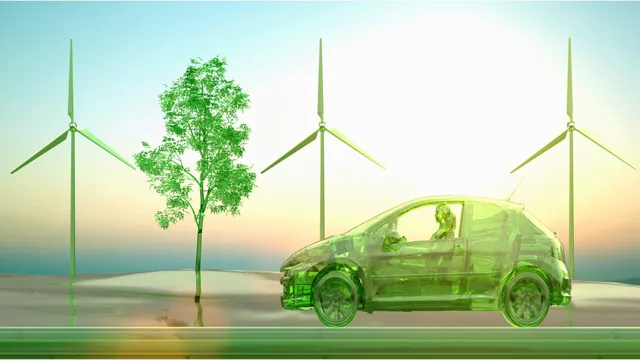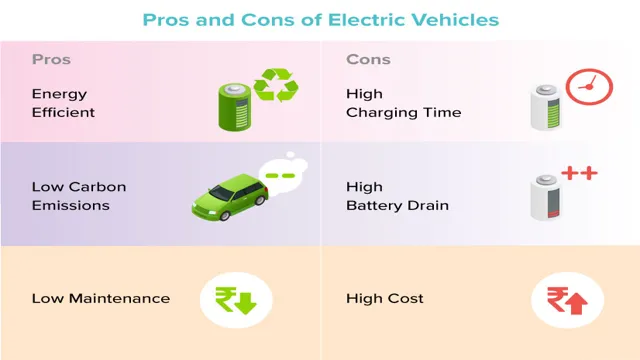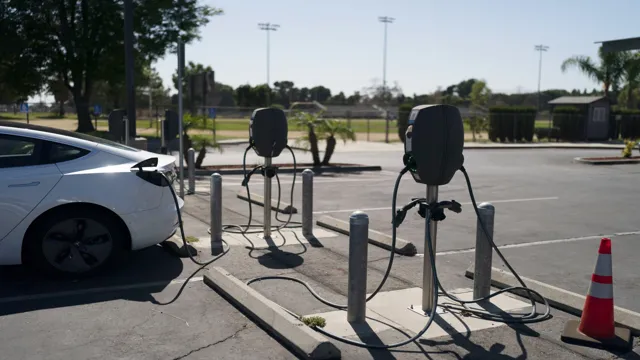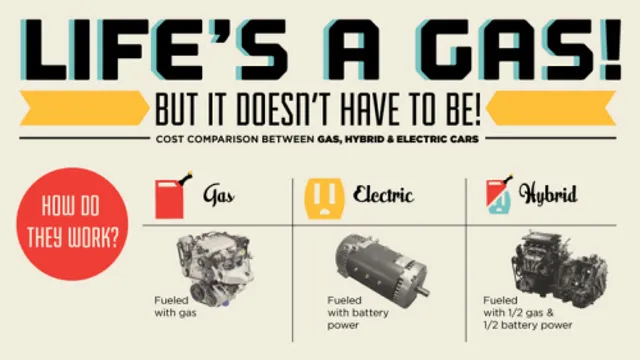Going Green and Saving Green: The Environmental Benefits of Owning an Electric Car
Electric cars have now become a viable alternative to traditional gasoline-powered vehicles, providing several benefits to the environment. With climate change becoming an increasingly pressing issue, it is crucial to consider ways in which we can reduce our carbon emissions. Electric cars represent a significant step towards a greener future, offering numerous environmental advantages such as reduced air pollution and lower greenhouse gas emissions.
In this blog post, we will explore the various environmental benefits of electric cars that make them an attractive option for eco-conscious drivers. So, buckle up, and let’s take a ride into the world of electric cars.
Reduced Emissions
The environmental benefits of an electric car are numerous, with one of the most significant being reduced emissions. Because electric vehicles rely solely on electricity instead of fossil fuels, they emit zero tailpipe emissions. This means that they do not release harmful pollutants such as carbon monoxide, nitrogen oxide, and particulate matter into the air.
In contrast, traditional gasoline-powered vehicles emit these pollutants, contributing to poor air quality and climate change. By driving an electric car, you can help to reduce your carbon footprint and the negative impact on the environment. Additionally, electric cars are often powered by renewable energy sources such as wind or solar power, further reducing their environmental impact.
Switching to an electric car is an excellent way to contribute to a cleaner, healthier planet.
Electric cars emit 54% less greenhouse gases than traditional cars.
Electric cars are becoming increasingly popular due to their reduced carbon footprint compared to traditional cars. In fact, studies have shown that electric cars emit 54% less greenhouse gases than their gas-guzzling counterparts. This is due to their reliance on electric power, rather than burning fossil fuels.
Electric cars use batteries that store energy that is used to power the car’s motor, resulting in much fewer emissions. This lower level of emission is beneficial for the environment, as it helps to significantly reduce air pollution. With a rise in awareness of the effects of greenhouse gases, people are making the switch to electric cars to do their part in reducing their carbon footprint.
In addition to environmental benefits, electric cars also offer several financial benefits. They require less maintenance, resulting in lower maintenance costs. They also require less fuel, leading to lower fuel costs.
In conclusion, making the switch to electric cars can be a smart choice both financially and environmentally.
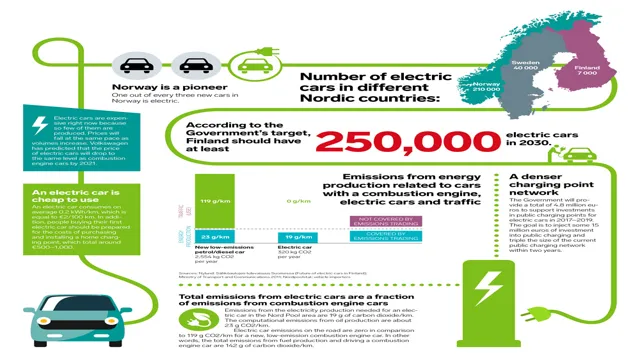
Electric cars also produce zero emissions from their tailpipes.
Electric cars are becoming more and more popular as people become increasingly concerned with reducing emissions and protecting the environment. One major benefit of these cars is that they produce zero emissions from their tailpipes, unlike traditional gasoline-powered vehicles. This means that electric cars do not release harmful pollutants into the air, making them a much greener option for those who prioritize sustainability.
In addition to benefiting the environment, reduced emissions from electric cars can also lead to improved air quality, which can have a positive impact on our health. Although electric cars still require energy to charge, they are overall a much more sustainable and eco-friendly option compared to traditional gasoline-powered cars.
Improved Air Quality
One of the biggest environmental benefits of owning an electric car is the improved air quality it provides. Exhaust fumes from gas-powered vehicles contain harmful pollutants like carbon monoxide, nitrogen oxides, and particulate matter, which can lead to respiratory illnesses, cardiovascular disease, and even cancer. Electric cars produce zero tailpipe emissions, drastically reducing the amount of these pollutants in the air.
In fact, studies have shown that if every car on the road was electric, air pollution in urban areas would decrease by as much as 30%. Plus, electric cars don’t require oil changes, which means less used motor oil being improperly disposed of and polluting our water and soil. By driving an electric car, you can contribute to healthier air quality in your city and help mitigate the impacts of climate change.
Electric cars help reduce air pollution by emitting fewer pollutants such as nitrogen oxides and particulate matter.
Electric cars are becoming increasingly popular as people are starting to realize the benefits they offer. One of the most significant benefits of electric cars is their contribution towards improved air quality. By emitting fewer pollutants such as nitrogen oxides and particulate matter, electric cars help to reduce air pollution.
These pollutants are a major source of environmental degradation and a leading cause of respiratory illnesses such as asthma. Electric cars offer a cleaner and more sustainable alternative to traditional gasoline-powered vehicles, reducing the amount of harmful pollutants that are released into the air we breathe. As more people switch to electric cars, we can expect to see a significant improvement in air quality, creating a healthier living environment for all.
It’s time to take action and make the switch to electric cars to safeguard our health and the health of the planet.
This means cleaner air for everyone, especially those living in densely populated areas.
Improved Air Quality Residents of densely populated areas around the world have been suffering from poor air quality for years. However, the development of new technologies and renewable energy sources provides hope for a cleaner and healthier future. By switching from fossil fuels to cleaner alternatives, we can reduce greenhouse gas emissions and air pollution.
This means cleaner air for everyone, especially those living in densely populated areas. Improved air quality can have a significant impact on our well-being by reducing the risk of respiratory diseases and other health issues. Air pollution is a complex and challenging issue that requires a multifaceted approach.
But by making small changes to our daily lives, we can take meaningful steps towards improving air quality. For example, we can reduce our reliance on personal cars and instead opt for public transportation or cycling. We can also support renewable energy sources by investing in green power companies or installing solar panels on our homes.
The benefits of cleaner air go beyond just our physical health. Improved air quality can also have positive effects on mental health and general well-being. People living in areas with high levels of air pollution are more likely to experience stress, anxiety, and depression.
By improving air quality, we can create a safer and more peaceful environment for everyone. In conclusion, improved air quality is a fundamental issue that affects us all. By utilizing cleaner energy sources and making small changes to our daily routines, we can create a healthier and more sustainable environment for ourselves and future generations.
Let’s work together to make the world a better place for us all to live in.
Reduced Dependence on Fossil Fuels
One of the biggest environmental benefits of an electric car is its reduced dependence on fossil fuels. Traditional vehicles are powered by gasoline or diesel, which release harmful emissions into the atmosphere and contribute to air pollution. Electric cars, on the other hand, rely on electricity from renewable sources like solar, wind, and hydro power.
This reduces the greenhouse gas emissions that come from burning fossil fuels and helps to combat climate change. Additionally, as more renewable energy sources come online, electric cars will become even more eco-friendly and sustainable in the long run. Overall, switching to an electric car is a great way to reduce your carbon footprint and support a cleaner, greener future for our planet.
Electric cars help reduce our dependence on fossil fuels because they can be powered by renewable sources such as solar and wind energy.
Reduced Dependence on Fossil Fuels Electric cars are gaining popularity, and it’s not hard to see why. They are not only good for the environment, but they can also reduce our dependence on fossil fuels. Fossil fuels, such as oil and gas, are finite resources that have come under intense scrutiny in recent years due to their impact on the environment.
With electric cars, we have a viable alternative that can be powered by renewable sources such as solar and wind energy. This means that we can reduce our reliance on non-renewable resources, while also embracing sustainable sources of power. By switching to electric cars, we can do our part in reducing carbon emissions, which is vital when it comes to fighting climate change.
These vehicles emit zero emissions, which is a significant contrast to petrol and diesel cars that release harmful pollutants into the air. Electric cars are an ideal solution for reducing carbon footprint because they not only help reduce our dependence on fossil fuels, but they also promote the use of clean, renewable energy sources. Furthermore, electric cars can enhance energy security.
Fossil fuels, being finite resources, can be subject to geopolitical conflicts and fluctuations in prices. However, by using renewable energy sources, we can insulate ourselves from the uncertainties that come with fossil fuels. We can generate our electricity through solar or wind energy, which are both abundant and secure sources of power.
In conclusion, electric cars have the potential to revolutionize the transport industry. They provide an excellent opportunity to reduce our dependence on fossil fuels while embracing renewable energy sources. By doing so, we will be doing our part in combating climate change and promoting sustainable development.
So let’s embrace electric cars and take a step towards a cleaner, greener future.
This is important for reducing carbon emissions and addressing climate change.
Reduced Dependence on Fossil Fuels Reducing dependence on fossil fuels is one of the keys to addressing climate change. Our current energy system relies heavily on burning fossil fuels, which releases carbon dioxide and other greenhouse gases into the atmosphere. This accumulating concentration of greenhouse gases traps heat and causes global warming.
However, transitioning to renewable energy sources like solar, wind, and hydropower can help reduce our carbon footprint and combat climate change. Not only are renewable energy sources cleaner, but they’re also becoming more affordable and accessible. Solar panels and wind turbines are becoming more efficient and affordable, making them better alternatives to fossil fuels.
In fact, there are now many parts of the world where renewable energy is cheaper than fossil fuels. By transitioning to renewables, we can also reduce our dependence on imports of oil and gas, which often come with geopolitical and economic instability. Making this transition will require investment in research and development, as well as policies that incentivize the use of renewable energy.
But if we take action now, we can build a more sustainable energy system and work towards a cleaner, healthier future for all.
Cost Savings
Electric cars offer a range of environmental benefits, including cost savings over time. While the upfront cost of purchasing an electric car may be higher than a gas-powered vehicle, the savings in fuel costs and maintenance expenses make it a wise investment in the long run. Since electric cars do not rely on gasoline, their owners can save hundreds or even thousands of dollars annually in fuel costs.
Additionally, electric cars require less maintenance and have fewer mechanical components than combustion engine cars, resulting in lower repair bills and downtime. In the end, the environmental benefits of transitioning to an electric car also come with practical financial advantages, making it a smart choice for both the planet and your wallet.
Electric cars have lower fuel and maintenance costs over their lifetime compared to traditional cars.
When it comes to purchasing a vehicle, one of the main things we consider is the cost. And while electric cars may have a higher upfront cost compared to traditional gas-powered vehicles, they can actually save you money in the long run. This is because electric cars have lower fuel and maintenance costs throughout their lifetime.
For starters, the cost of charging an electric vehicle is much lower than filling up a gas tank. And, with the growing availability of public charging stations, it’s becoming more convenient than ever to charge up your EV on the go. Additionally, electric cars require less maintenance compared to traditional cars, meaning that you’ll save money on oil changes, brake replacements, and other routine maintenance tasks.
While electric vehicle technology is still relatively new, the financial benefits of owning an EV are quickly becoming more apparent. So if you’re looking to save money on your daily commute and reduce your carbon footprint, consider making the switch to an electric car.
Conclusion
In conclusion, electric cars are not only stylish and impressive feats of engineering, but also offer a plethora of environmental benefits that cannot be ignored. From decreased CO2 emissions to less pollution in our air and waterways, electric cars are the responsible choice for those looking to make a positive impact on the planet. So next time you hit the road in your electric vehicle, take a moment to appreciate the fact that you are not only saving money on gas, but also doing your part in preserving the environment for generations to come.
Drive on, eco-warriors!”
FAQs
What are some environmental benefits of driving an electric car?
Electric cars produce fewer greenhouse gas emissions than gasoline-powered vehicles, which can help reduce air pollution and combat climate change. Additionally, because they don’t rely on fossil fuels, electric cars can help decrease our dependence on non-renewable resources.
Are electric cars more expensive to maintain than traditional cars?
Generally, electric cars require less maintenance than traditional cars because they have fewer moving parts and don’t require oil changes. However, the initial cost of buying an electric car can be higher than a traditional car.
How far can an electric car travel on a single charge?
The range of an electric car varies depending on the make and model, but most can travel between 100-300 miles on a single charge. However, driving habits, weather conditions, and other factors can affect the range.
Are there any tax incentives for purchasing an electric car?
Yes, there are federal and state tax incentives available for purchasing an electric car. These incentives can help offset the initial cost of buying an electric car and make it a more affordable option.
